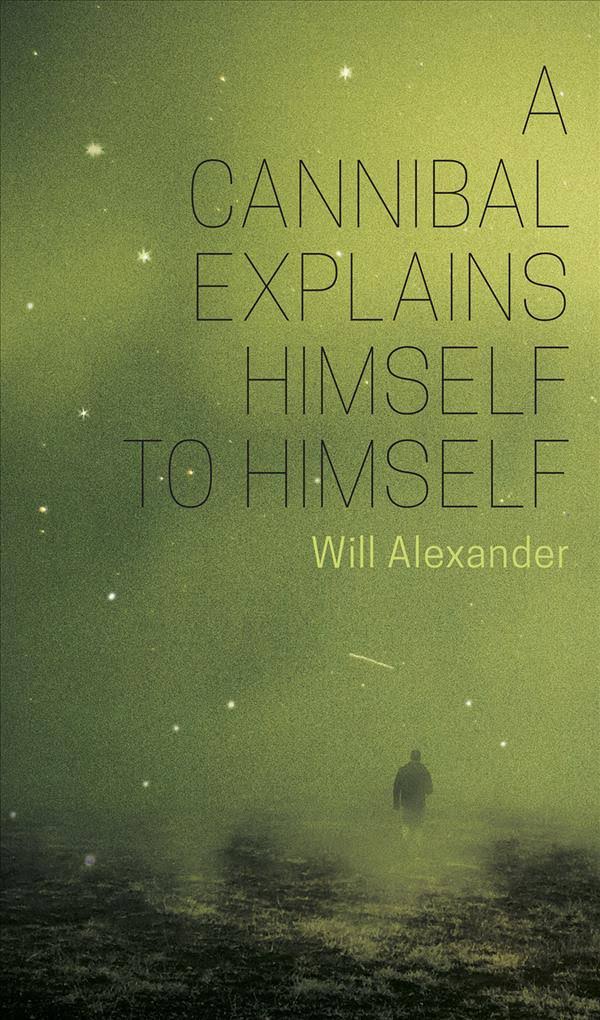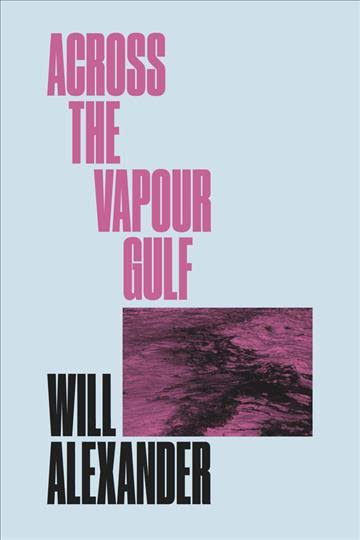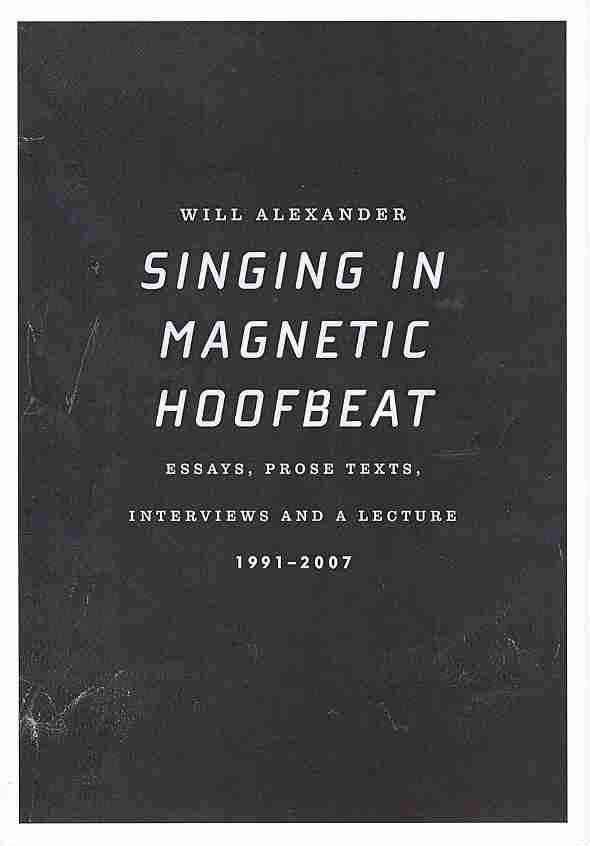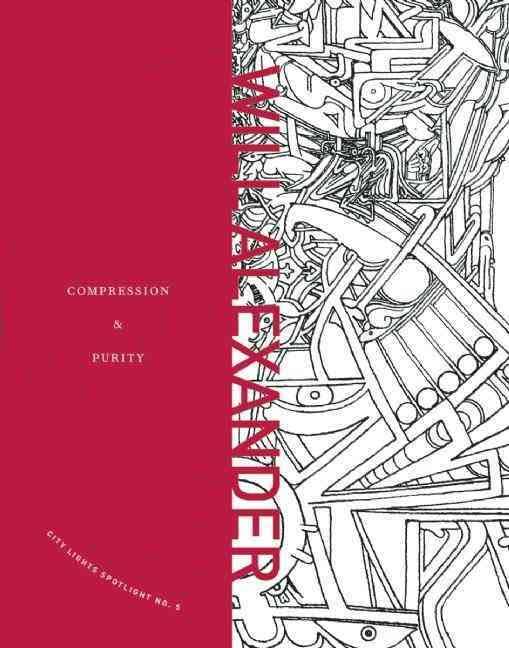Will Alexander
A Cannibal Explains Himself to Himself
The Elephants, 2019
ISBN 978-1-988979-28-1
Across the Vapour Gulf
New Directions, 2017
ISBN 978-0-8112-2681-3
Singing in Magnetic Hoofbeat: Essays, Prose Texts, Interviews and a Lecture, 1991-2007
Essay Press, 2012
ISBN 978-0-9791189-7-5
Compression & Purity
City Lights, 2011
ISBN 978-0-87286-541-9
“Language, drawn toward its light, jets upward,” writes poet, multidisciplinary artist, and philosopher Will Alexander. If language is energy “that seems to supersede itself continuously,” the force is with him. Neither electrical, nor magnetic—more, a visionary burning in an alchemical chamber. These pages—prose, poetry, aphorism—express a signature, expansive tonality: Alexander’s sounding.
Sounding performs, awaits a resonant echo. In Compression and Purity, Alexander’s recent poetry collection, the speaker considers “myself, the poet sending signals into mystery, and having them return to me with oneiric wings and spirals” (“On Anti-Biography”). When I asked a few poets to tell me about art and artists they most resonated with, the question seemed to rattle them. As if they were being asked to climb up to a high narrow platform in order to launch into oceanic depths. Or inner space. (Recently in the news, Opportunity—rover chemist traveling on uninhabited Mars—has gone silent; Curiosity still trundles.)
Whatever the form, Alexander’s invocatory language can feel summoned (conducted, channeled, incanted). The objects off which his work is sounding are, seemingly, inner and non-local, resident in unexplored realms where churn bewildering, primal forces:
like hypabyssal fragments
or moth schematics
light from collective hydrology (“Horizon as Parallel & Sonar”)
Encounter follows encounter in service of extending multitudes beyond Whitman (from Song of Myself, “My voice goes after what my eyes cannot reach”). Many worlds of human (and transpersonal?) knowledge mingle in this witnessing.
No doubt surrealist poets and poetics (among them, Aimé Césaire, Bob Kaufman, Philip Lamantia) influenced Alexander, but other terms extend the map. Say, imaginal—as in the “imaginal radiance” he finds in Gaston Bachelard, with whom he shares an ease both kinetic and spatial—cosmic reverie sails before the wind. Or say, internal technology. Speaking without notes on a panel titled “Mind Meld: Reimagining Creative Writing and Science” at the 2019 AWP conference in Portland, OR, Alexander referred to ancient “internal technologies,” means of psychoneurological travel using “imagination as source field.” Opening Compression & Purity at random several pages in to “Water on New Mars”:
I weave […]
beyond the memoir of entropy
becoming a great triangular neon sail
on an astral frigate
on Mayan bark as lacunae
The youthful Alexander recognized Coltrane and others as allies. Try, consciousness jazz. Where the cosmic imagination—Alexander’s resonant chamber—is “a bell in a grotto.” If the writer is receiver, sounding is question, call and response, catalogue. From his collected aphorisms, Across the Vapour Gulf: “This being an exploration I’ll call Algerian Neutrino, not a superficial form, not a patina of dust sustained by inclement electricity. It is like climbing a trellis of otherness, opening an aural canal that opens onto the galactic continuum.” (If authority adheres to a complex interwoven tapestry, how tempting it is to quote at length.)
Reading Alexander, I was also reading Celan, who, in his Meridian speech, proposes that “Poetry rushes ahead” towards encounter with the strange, the “uncanny.” In his latest prose collection, A Cannibal Explains Himself to Himself, Alexander writes of “inner language” “naturally suffused by the uncanny,” “by an incalculable accuracy that carries sparks writhing with evolutionary tension.” Climbing that trellis of otherness, exploratory, experimental gestures rush toward—what? David Mutschlecner writes that poetry gives us “the mystery of personhood.” If one identifies with the Vastness, it’s one big, uncontainable self. If every poet reaches toward the heretofore unrecognized self, Alexander has volunteered for the farthest edge, incognita. Emergence asks, Who am I?
Perhaps the implicit questions roaming new linguistic space are—What is meaning? What is reality? If the question is: Are we hypnotized by the fragmentary?, Alexander’s answer is Yes. Several essays in A Cannibal consider the provincial brokenness of Western psychology and history “knowing all the while that war is our predominant skill-set.” Insofar as interior travel requires deep attention to “the unmeasured summa of eternity” (Across the Vapour Gulf), this body of work questions expected meanings, constructed rigidities. Robert Kelly: “science is the same as poetry / only it uses the wrong words.” Reading Alexander reminds me of being transported by Kubrick’s 2001 for the first time. What does it feel like to evolve beyond one’s everyday self-concept?
To be present on any voyage requires the cultivation of openness. In unfamiliar territory, language and art are “capable of creating shifts in the human neural field” (C&P, “My Interior Vita”). (A friend and I swear to not be so judgmental about poetry we don’t at first resonate with: “we can learn from everyone.”) “The body then seems to exist as this arachnoidal connective, as a seminal light source in being,” Alexander writes (AVG). A chamber “cleansed of detritus” is capable of sensing connective threads everywhere. Through receptivity, capacity enlarges, allowing for ‘cosmic’ play.
In this performance, diction—the manner of saying—shimmies and leaps. If Alexander’s work adopts ‘alien’ personas, forages many worlds, it necessarily employs niche vocabularies—scientific, mathematical, medical, legal, astral—to name a few. Declarative phrasing, emphatic projection, and specialized terms abound, creating a sense of, well, boundlessness, as in Compression & Purity’s opening poem: “I am never that condition within the fire of conjoinment” (“The Blood Penguin”). A refusal to occupy the quotidian can speak of the newborn “as plesiosaur”, for “diamonds in my mind […] being poetic spurs / being strange supraphysical hallucinatory hives”; can speak for “The Blood Penguin”:
I exist
as steep electrical ice
asking of myself spells
of pointless dominating fuels
Alexander’s Singing in Magnetic Hoofbeat assembles a bouquet of prose forms including interviews and personal essays on practice and meaning-making. Persuaded into new growth, words possess “the power of pyretic plasticity” (“Alchemical Anguish and Fire”) jarring a reader’s syntactical beliefs. Propellant language takes on the expansive drive of galaxies: “The voice then ceases to conclude on a point, or stare at surrounding virtues for approval.” Creating and exploring linguistic realms resists language-stasis, antiquated forms of thought and being, Alexander asserts. Original naming “is a new Dorado, capable at one touch of expansion and Utopia.”
Compression & Purity’s speaker might be a Creator surveying “across the flank of exploding glacier tables / across a lake of random gravel fires” (“On Scorpions & Swallows”). Projecting a permeable openness, encompassing “[…] earthquake curricula / in which a form of flames spirals / frayed at its core by potentia” (“Amidst the Liminal”), calls forth an alternative Genesis. Call it border research from a maker of proto-Realities. Call it poesis. Startling intra-worldly images (“a blue in-carnivorous thought arrangement,” body “an apparitional ballast,” horizon “as floating ocular ravine”) generate an oracular plasma. Opening new space in consciousness requires rupture “of utilitarian culture”, takes “going into the alien provinces of the spirit” (Singing in Magnetic Hoofbeat, “Alchemical Dada”). To meet the alchemist—one’s otherness source—one must bypass conventional ecopoetic and consciousness frameworks. (From Michael Pollan’s How to Change Your Mind: “the hidden vastness of the mind is a felt reality.”) This poet-shaman’s prerequisite for creating: “understanding the natural atmosphere of one’s mind” (“A Small Balletic Hive”). The voice is detached, austere, prophetic. Seek, and you shall uncover, he might advise less adventurous artists.
In an interview with Harryette Mullen, he discusses finding (making?) his unique expressiveness. If language maps the contours of awareness, this cartographer parkours—by anomalous linkage, neuronal impulse, and chance operation—to that acrophobic platform where “images arise from a high state of risk” (SMH, “Alchemy as Poetic Kindling”). Alexander follows the risk:
I consider myself a reddish Shinto crow
then just as strongly
a black anathema crow
then just as quickly
a sun fed crow from snow washed volcanoes (C&P, “The Deluge in Formation”)
If this poet is a crow, “He flies, cycles transmute” (AVG).
Trading in detached wonder at interior largesse and pushing against conventional arrangements of meaning, Alexander’s poetry and prose are woven on one vast loom (thanks, CS). If we tap into primal fluency, who are we? Borrowing from John Cage, Donald Justice wrote: “[…] when the self has been cleared from the field, a fluency obtains which is characteristic of nature itself.” Might we face ourselves (from facere, “to make”) anew? Alexander’s work is political in the largest sense. In Portland, he urged the audience to “bend language” as a means of achieving what might be called psychosocial climate change. There is no bearing the anti-human and ecological costs of colonizing Mars (if settlement could even be achieved); our co-evolution with Earth limits our physical capacities. Beyond the rapacious, the possibility of human transformation—psychical, cellular—may be realized via new language and grammars, he insists.
Vibration in one system can set others to resonate (see Art’s myriad movements; see Politics, for good and ill). How else does Art touch us than by means of a transmittable, yet undefined, energy? Alexander writes of Charles Fourier that he “seizes us with fire and the ecstasy of dreaming” (SMH, “Charles Fourier”). Of Bob Kaufman, “I was magnetically engulfed” (“The Footnotes Exploded”). Poetic freedom journeys outside categories. (“The bigness of the world is redemption,” writes Rebecca Solnit.) Alexander’s poetry and essays sound potentiating, utopian music.
If “creation always probes, is a kinetic diorama” (“Transgression of Genre as Vitality”), perhaps what can mostly readily be said of Reality is that it is an ongoingness. Fed by the unknowable, the ever-present flux, Alexander’s sounding concerns both Wonder and Evolution—here, they are surely connected. Add to his already broad resume—language forays into the unknown. “I escape the territorial,” Alexander writes, a fearless rover of the interior.
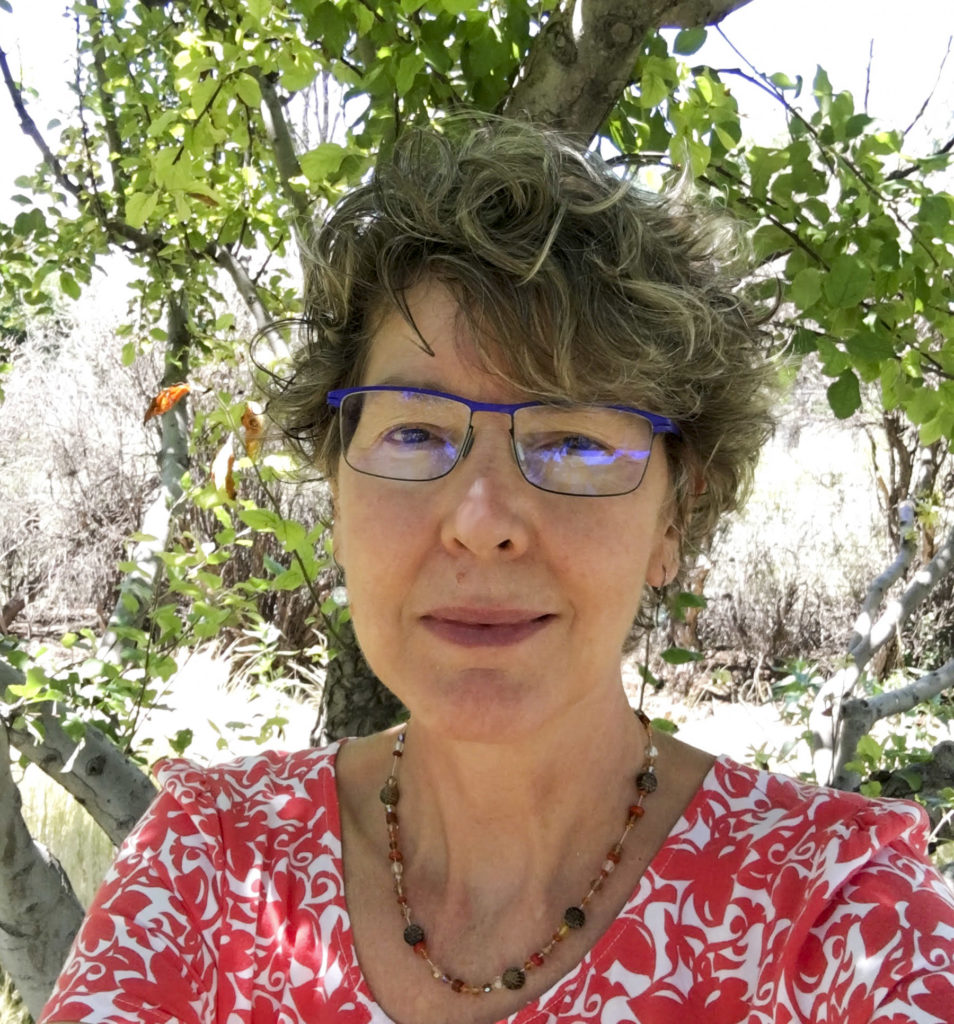
Mary Cisper, former analytical chemist, lives with goatheads in northern New Mexico. Her poetry has appeared in Colorado Review, Lana Turner, Denver Quarterly, Interim, PoetryNow, and elsewhere. Her first collection, Dark Tussock Moth, won the 2016 Trio Award and was published by Trio House Books (2017).
